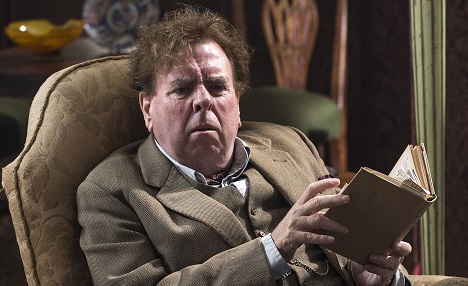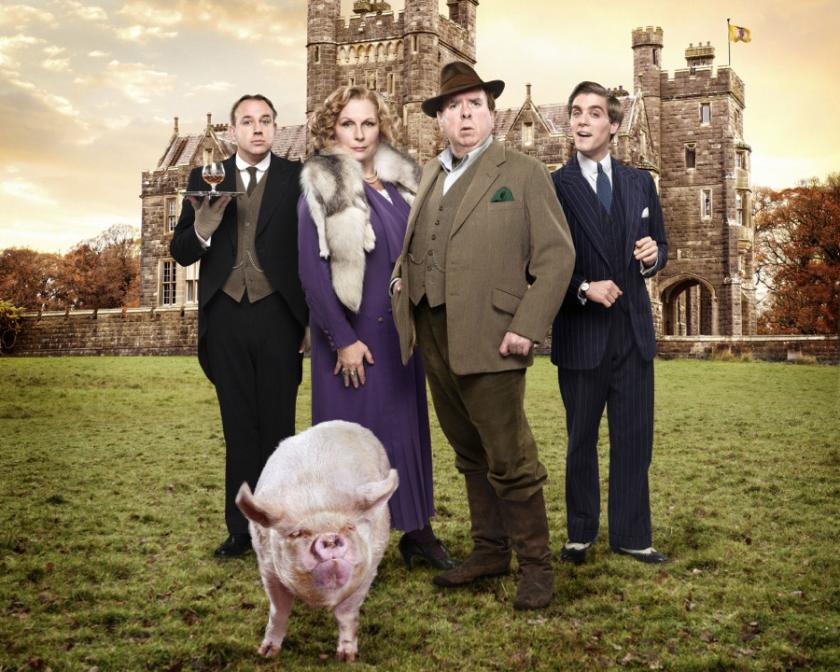A series about the bizarre shenanigans of a family of ludicrous aristocrats would seem an unlikely hit for 21st-century Sunday night telly. It worked for ITV’s Downton Abbey, though, and while that’s off air, BBC One is glueing over five million to the settee with Blandings, its adaptation of PG Wodehouse’s tales of the dotty Lord Emsworth, and his prize sow, the Empress. We're already well into the second series, with quite a roster of comic acting talent visiting Blandings Castle and threatening each week to destroy Lord Emsworth’s patch of bumbling, piggy Eden. In places, it’s a lot of fun, but no one involved really seems sure whether it’s a just a heritage-themed cartoon or a more ambitious piece of literary comedy.
For the first two episodes the intruders were Harry Enfield’s raving Duke of Dunstable and Celia Imrie’s tyrannical sister, who both overplayed the menace. The threat of a fearsome auntly dressing down is an essential motivator in many a Wodehouse plot, but like most deterrents, it’s more effective when it lurks, than when, like Enfield, it roars non-stop, russet-faced and spittle-flecked (not unlike one of the characters from Enfield’s sketch shows). It was so relentlessly hammy it must have made the Empress nervous. So it was a relief, this week, to have Julian Rhind-Tutt, Emsworth’s endearingly louche younger brother Galahad Threepwood, as the disruptive force, threatening not to turn Blandings Castle into boot camp, but to shame it with his scandalous memoirs.
it’s fun, in places, and box set sales will no doubt be lively
The genius of Wodehouse’s stories is their combination of slick comic plotting with his poised but outrageous wit. Without the prose style, you just have a cartoon; the quality of the prose redeems the silliness of the plotting, creating a beautifully layered comic vehicle combining everything from broad physical comedy to the most exquisite, soulful empathy, such as Emsworth’s touching soliloquy on the horrors of London life. Adapting Jeeves and Wooster, Wodehouse’s most memorable lines have to be included because so many of them are spoken by Jeeves; with Blandings, it’s much harder to balance to pace and prose effectively.
This series doesn’t really seem to have tried. Most of the best lines remaining in the script are given to Emsworth’s bossy sister Connie (Jennifer Saunders), who says, for example, to Emsworth’s son Freddie: “If brains were dynamite, you couldn’t blow the fuzz off a peach.” Surprisingly, given Saunders’s comic experience, they’re sometimes rushed, as if she’s been told to get a move on, in case the viewers turn over to Dancing on Ice before she finishes a particularly elegant sentence. Like Wilde’s best lines, Wodehouse's need space, and reverence.
 The acting, too, isn't sure what kind of comedy to project, and mostly exaggerated. Timothy Spall’s Lord Emsworth (pictured, right), though skilfully played, is so daft you wonder how he remembers to put one foot in front of the other. Jack Farthing’s Freddie is worse. The pick of the first series was Mark Williams’s performance as the butler, Beech, an inscrutable well of alcoholic subversion, but he’s been replaced by punster Tim Vine. While it’s fun, in places, and box set sales will no doubt be lively, most of it never rises above slapstick. Had they trusted the audience to digest more of the original language, they could have had something really special to show us.
The acting, too, isn't sure what kind of comedy to project, and mostly exaggerated. Timothy Spall’s Lord Emsworth (pictured, right), though skilfully played, is so daft you wonder how he remembers to put one foot in front of the other. Jack Farthing’s Freddie is worse. The pick of the first series was Mark Williams’s performance as the butler, Beech, an inscrutable well of alcoholic subversion, but he’s been replaced by punster Tim Vine. While it’s fun, in places, and box set sales will no doubt be lively, most of it never rises above slapstick. Had they trusted the audience to digest more of the original language, they could have had something really special to show us.















Add comment